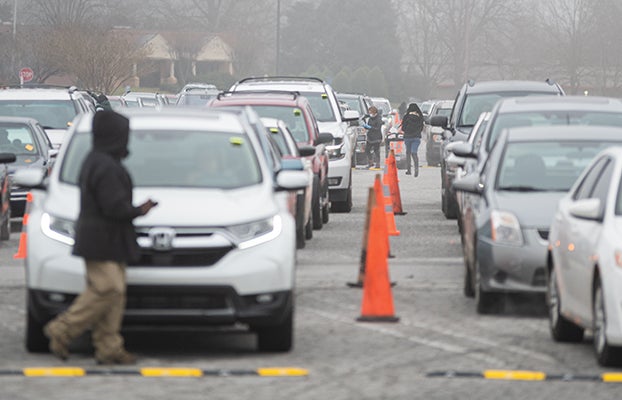Josh Bergeron: Memorial can help ensure pandemic isn’t lost to time
Published 12:00 am Sunday, October 17, 2021

- Josh Bergeron / Salisbury Post - Rowan County Health Department workers administer vaccines in the parking lot of West End Plaza.
By Josh Bergeron
Will we remember?
Far in the future, long after anyone reading this column is gone, will reflections about COVID-19 be as divided as current attitudes? How will the community mark the tremendous toll the virus has taken on Salisbury, Rowan County and the country?
Hundreds have died in Salisbury-Rowan — educators, law enforcement officers, military veterans, railroad engineers, textile workers, parents, grandparents, sons, daughters and people who made the community a better place to live. Health care workers confronted unique trauma and stress because of filled hospital beds. Some businesses permanently closed. Others scratched and clawed their way through the depths of economic troubles. Employees reevaluated their priorities after layoffs or furloughs.
The previous 19 months produced unimaginable tragedy that cannot be reversed. However, if we face history head-on and appropriately remember the dead, we can avoid repeating the past. That’s why Salisbury and Rowan County should consider creating a memorial just as community members have done for previous historic events.
In Washington, D.C., a temporary memorial was as simple as placing a sea of small white flags on the National Mall to commemorate the deaths. No one really knows what a permanent pandemic memorial is supposed to look like. Should it picture a nurse or a health care worker? Should it be a list of names?
The features of a local COVID-19 memorial, particularly if it involves public funding, will be debated at length. Local leaders can shepherd the debate to its conclusion with a group of citizens similar to Salisbury’s Public Art Committee. That panel can solicit submissions, select finalists, hold public hearings and decide on the most-liked choice.
For Salisbury and Rowan County, the most important feature of a memorial should be a list of those lost to the pandemic. As of Friday, there are 437 such names in Rowan County. Each name has a story and all of those stories were ended by COVID-19.
The best location to start may be West End Plaza, where the Rowan County Health Department focused many of its COVID-19 efforts — testing, handing out masks and vaccinations. Rowan County commissioners also plan to re-examine whether to move the Health Department there from the current, crowded location. Pairing a new Health Department location with a memorial can appropriately memorialize the dead while also recognizing the tremendous cooperation required by volunteers, health care professionals, public employees and others.
There is enough space at West End Plaza to create a memorial in the central hallway, at the entrance to the Health Department office or the front of the building.
A memorial also can built without addressing the politics of vaccines or any of the issues that have divided the public and still have the same effect: ensuring the public never forgets.
There is no memorial for the 1918 influenza pandemic, and the cultural awareness of the tragedy it caused is close to zero.
In 2018, the Salisbury Post’s Mark Wineka gave the public a window into 1918 when he wrote about how locals were affected by the Spanish flu. The actual number of flu deaths in the county in 1918 are not known, Wineka wrote.
“Spanish flu did its work and passed over the county at November’s end, leaving thousands weak, some dead and others crippled for life,” Wineka wrote, quoting the historian James S. Brawley.
A 1918 telegram from State Board of Health Secretary W.S. Rankin to Dr. C.W. Stiles of the Public Health Service office in Wilmington stated, “Kannapolis, Cabarrus County, six or seven thousand people, three doctors, 2,000 cases influenza. Doctors about exhausted. Condition urgent and serious. Please have three nurses and two doctors sent them earliest possible moment.”
Both accounts sound eerily familiar. There have been more than 25,000 local cases of COVID-19, hundreds of deaths and an unknown number of people hospitalized since the start of the pandemic. Many of those who contracted the virus will suffer from lifelong health problems.
By memorializing the dead and commemorating collaboration required to fight the pandemic, Salisbury and Rowan County can ensure people in 50, 75 or 100 years from now — whenever the next pandemic occurs — will have a clearer picture about the terrible toll it might inflict on the public. They will know, too, we all need to work together to minimize its negative effects.
Josh Bergeron is editor of the Salisbury Post.

